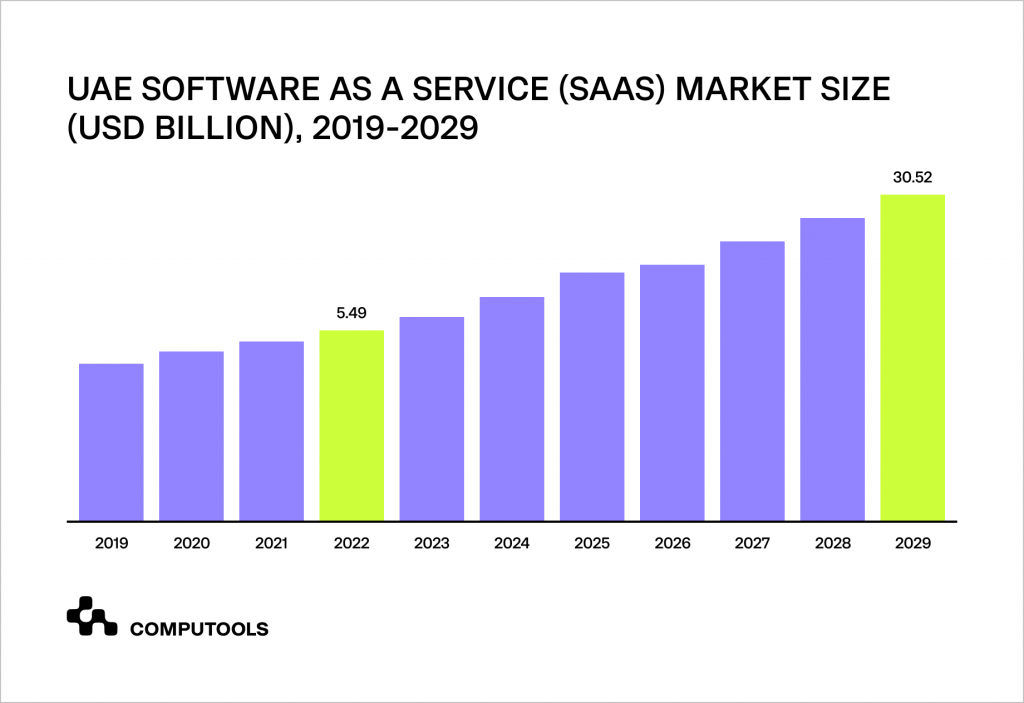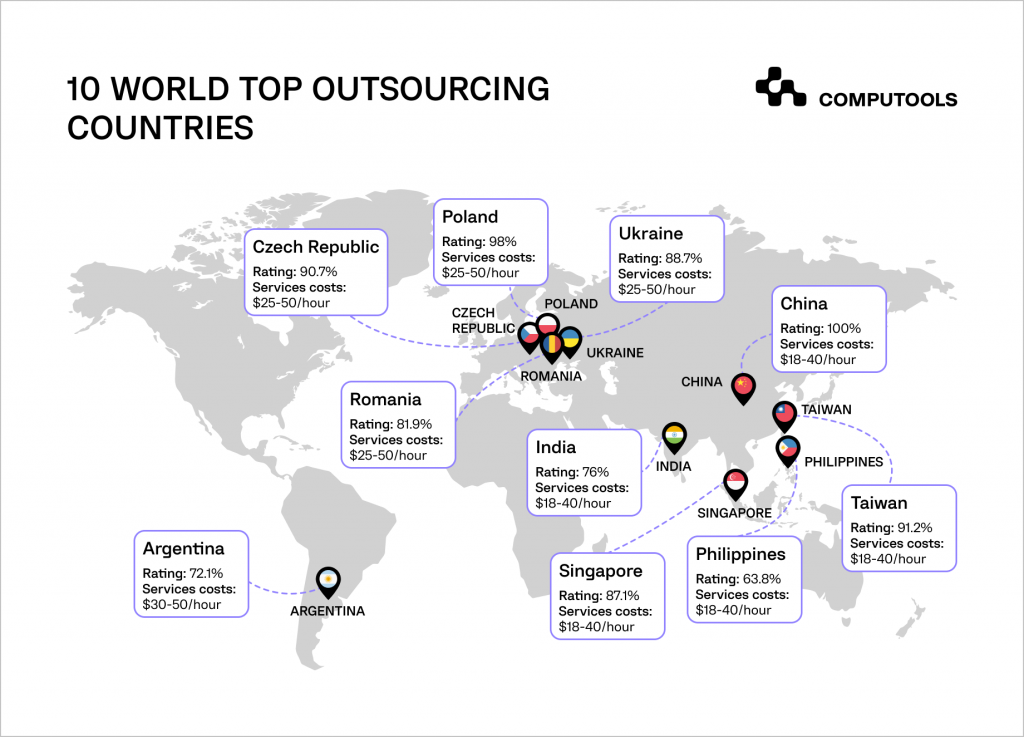The broader technological surge in the Middle East shapes the current business software development trends in the UAE. The United Arab Emirates’ IT industry is experiencing significant expansion, especially noticeable in the post-COVID-19 era.
In 2024, the region is projected to emerge as a major world hub for digital innovation.
However, like any other location, the UAE introduces a spectrum of advantages and challenges that businesses should carefully evaluate before committing to investments.
In this article, we’ll delve into the technological future of the tech market in the UAE, exploring the impact of the talent gap in the region and examining the solutions that the contemporary IT market can offer to address this challenge. Let’s begin!
Business Software Development in UAE
The technological landscape in the UAE is experiencing continuous growth. The government in the region is proactively investing in technology and innovation as part of efforts to diversify the country’s economy beyond reliance on oil.
Considerable investments have been made in the software and services sectors, particularly in domains such as smart services, AI and cloud software development, as reported by Business Monitor International (BMI).
These significant capital investments have a strong impact on the expansion of the IT sector in the UAE and the market growth is already evident in many spheres.
In particular, the market size of software as a service (SaaS) in the UAE is solely forecasted to expand at a CAGR of 27.93%, ultimately reaching a value of US$30.52 billion by 2029.

Recognising the market potential, global businesses are increasingly focusing on the UAE, intensifying the demand for software services.
Large international companies are choosing Dubai because it offers attractive benefits, including higher-than-average wages and a tax-free system for both employees and companies.
The Dubai International Financial Centre is especially popular, offering a business-friendly environment and attracting major companies like Mitsubishi, Nestlé, Google, Amazon and IBM.
According to Forbes, the UAE aims to lead in global technology, as per its recent strategy for the next 50 years.
They’re focusing on key areas like communication technologies and services, financial services, retail, tourism and hospitality, healthcare and medical services, infrastructure construction, transportation, and warehousing logistics.
These factors collectively position business software development in the UAE for substantial growth in 2024 and beyond, driven by strong government support, entrepreneurial activity and technological advancements.
Top Software Development Trends in UAE in 2024
The fourth industrial revolution has brought remarkable technological progress worldwide.
A country’s success in digital transformation depends on how well it adopts new technologies like artificial intelligence (AI), blockchain, cloud computing and the Internet of Things (IoT).
Let us present to you the list of trends that will drive business evolution in the UAE in 2024.
1. Cloud Computing
The UAE has experienced a surge in cloud computing adoption driven by the impact of COVID-19. This has attracted two investor groups: SMEs seeking hybrid work environments and large businesses aiming to expand to new locations.
The statistics from HashiCorp’s research reveal that a significant 90% of large enterprises globally have already embraced a multi-cloud infrastructure.
Notably, large enterprises exhibit a higher propensity for multi-cloud usage, contrasting with smaller businesses.
However, SMEs are also investing heavily in cloud-based custom software development to bridge the tech gap between on-site and remote workforces.
The trend towards cloud computing is expected to continue in the Middle East, simplifying collaboration, providing access to advanced tools and enabling the construction of more scalable and flexible systems.
2. Artificial Intelligence and Machine Learning
The UAE takes a leading role in using AI technology. UAE developers are already leveraging AI solutions to automate repetitive tasks, enhance code optimisation and elevate user experiences.
The global artificial intelligence market is anticipated to undergo significant growth, reaching a valuation of $1,811.8 billion by the year 2030.
The National Artificial Intelligence Strategy 2031 created by the UAE government outlines eight strategic objectives, accompanied by various initiatives targeted at integrating artificial intelligence in critical sectors such as education, government and community well-being.
The country aims to quickly adopt emerging ML solutions and create an environment that attracts talented specialists.
3. Low-Code Development
Low-code development is increasingly embraced by organisations aiming to accelerate their digital processes.
Using these platforms enables developers to quickly and effortlessly build applications without the need for an extensive understanding of coding.
Low-code technology allows businesses to respond swiftly to changing market demands, innovate efficiently and involve a broader range of stakeholders in the application development process.
In line with this trend, the UAE organised the Middle East Low Code No Code Summit in 2022, recognising the significance of these approaches in driving transformation, a current focal point for the UAE.
4. Digital Transformation
Digital transformation services are rapidly gaining traction in the Middle East. The UAE government is proactively fostering innovation and entrepreneurship through initiatives such as the Dubai Future Accelerators.
This programme provides businesses with invaluable access to government entities, allowing them to test and develop their technologies in collaboration with established institutions.
Numerous companies will continue actively embracing cutting-edge technologies, including AI, IoT software solutions, big data and cloud solutions, in 2024.
This transformation aims to enhance operational efficiency, foster agility, create novel customer experiences and open up new revenue streams.
5. IoT (Internet of Things)
The Internet of Things (IoT) encompasses a vast global network that interconnects a multitude of devices, ranging from wearables and smartphones to commercial equipment and household appliances.
As this network continues its expansion, it presents a dynamic landscape for software developers in the UAE.
Their task is not only to create applications that function seamlessly across diverse hardware and software platforms but also to navigate the intricate web of challenges inherent in the IoT.

Computools
Software Solutions
Computools is an IT consulting and software engineering company that delivers innovative solutions to help businesses unlock tomorrow. Our clients represent a wide range of industries, including retail, logistics, finance, healthcare, and others.
Skill Gap and Other Software Development Challenges in UAE
Challenge: Skill Gap
Business software development in the UAE is facing a big challenge. According to the UAE Employment Report, only 11% of respondents view a job in IT and computing as their ideal future role, causing a major talent gap in the rapidly evolving tech landscape of the UAE.
Solution: Software Outsourcing
To tackle the challenge of the skill gap effectively, many businesses in the UAE are turning to talent outsourcing.
Outsourcing allows companies to access a pool of skilled professionals worldwide, providing them with the specific expertise needed for their projects.
This not only accelerates project timelines but also brings diverse perspectives and experiences into the development process.
Additionally, outsourcing enables local teams to focus on strategic tasks, saving time and money.
Challenge: Rapidly Evolving Tech Landscape
The UAE businesses contend with the continuous evolution of digital trends and tools, navigating an environment where staying ahead is not just a preference but a necessity for sustained success in the digital realm.
Solution: Continuous Innovation and Subject Matter Expertise
In the Global Innovation Index 2022, the UAE holds the thiry-first position worldwide and takes the top spot regionally.
Keeping up with the ongoing world trends is important not only for the government but for the businesses inside the country.
To thrive in this dynamic landscape, businesses need to be consistently innovative. This doesn’t just mean keeping an eye on the latest gadgets but fostering a culture of creativity and adaptability.
Moreover, having subject matter experts and individuals deeply knowledgeable in specific areas is like having navigators in uncharted technological waters.
These experts bring a wealth of insight and experience, ensuring businesses not only keep pace with the changes but lead the way in embracing cutting-edge solutions.
Challenge: Competitive Market
The UAE’s business arena is characterised by intense competition, with companies striving to carve their niche and capture market share.
With the development of small business and start-up initiatives, more and more companies are thinking about ways to gain a competitive advantage in the region.
Solution: Digitalisation
To thrive in the competitive market, medium-sized businesses and corporations are turning to digitalisation.
This strategic move involves integrating digital technologies into various aspects of their operations, from customer engagement to internal processes.
Embracing digital tools enhances operational efficiency, allows for personalised customer experiences, and positions businesses as tech-savvy players in a crowded market.
Choosing the Best Outsource Software Development Company for Your Business
Why Outsourcing?
Outsourcing is a smart way to address the talent shortage in the UAE for both large and small businesses.
For SMBs, outsourcing offers a pathway to access specialised skills and expertise without the need for significant in-house investment.
This allows them to focus on core business functions while leveraging external resources for specific tasks or projects.
Enterprises, on the other hand, benefit from outsourcing by gaining flexibility and scalability in their operations.
External service providers can seamlessly adapt to the evolving needs of large-scale projects, ensuring efficiency and cost savings.
Moreover, outsourcing allows enterprises to tap into global talent pools, accessing diverse skill sets and perspectives that contribute to innovative solutions.
Additionally, getting started on a project with outsourcing is quick—usually within three weeks of choosing specialists and signing a non-disclosure agreement, which takes an extra 1 to 2 days.
However, these benefits only apply if you carefully choose a reliable outsourcing company – a point we’ll talk about next.
Things to Consider
Before you finally decide to outsource software development for your business, consider the following set of questions to guide your evaluation:
• Is the company experienced in my project’s technologies?
• Are costs clear and within budget, accounting for potential hidden expenses?
• Does the team align with the UAE’s cultural norms and communication preferences?
• How does the company ensure data security and regulatory compliance?
• Does the company follow a defined project management methodology?
• Can the company adapt to changing project requirements and future growth?
• Have I checked its references and testimonials for reliability?
• Have I considered the time zone differences for effective communication?
Where to Look for a Partner
According to the Arab News media resource, in 2018, UAE organisations invested more than $4.8 billion in outsourcing services.
The projection anticipates growth to $6.8 billion by the end of 2024, demonstrating the significance of outsourcing for the Middle East region.
When deciding on an outsourcing destination, two crucial factors come into play – the quality of work and the cost. While finances drive every project, maintaining a balance with high-quality work is essential.
Some of the most favoured outsourcing destinations include Ukraine, Poland, the Czech Republic, India and Taiwan, with hourly rates ranging from $18 to $40 per hour.
Professionals in these countries demonstrate the required technical expertise, linguistic proficiency, and soft skills.
However, it’s crucial to consider factors like cultural background, work ethic and subject matter expertise before making a decision. This ensures seamless cooperation for both parties involved.

Conclusion
The UAE is in the midst of digitalisation, presenting opportunities for the widespread adoption of technology.
Businesses of all sizes can seize this moment to integrate cutting-edge technology into their existing software systems.
The emerging technologies provide valuable insights for companies willing to implement business software development trends in the UAE as a means to enhance profitability.
However, choosing the right outsourcing software development services in the UAE is a significant decision. It involves understanding the company’s approach to your project, establishing clear communication, and more.
Before finalising your choice among the top software development companies, thorough consideration of each element is crucial for the project’s ultimate success.
Finally ready to start building your perfect software? Contact info@computools.com now for valuable insights.











Computools was selected through an RFP process. They were shortlisted and selected from between 5 other suppliers. Computools has worked thoroughly and timely to solve all security issues and launch as agreed. Their expertise is impressive.